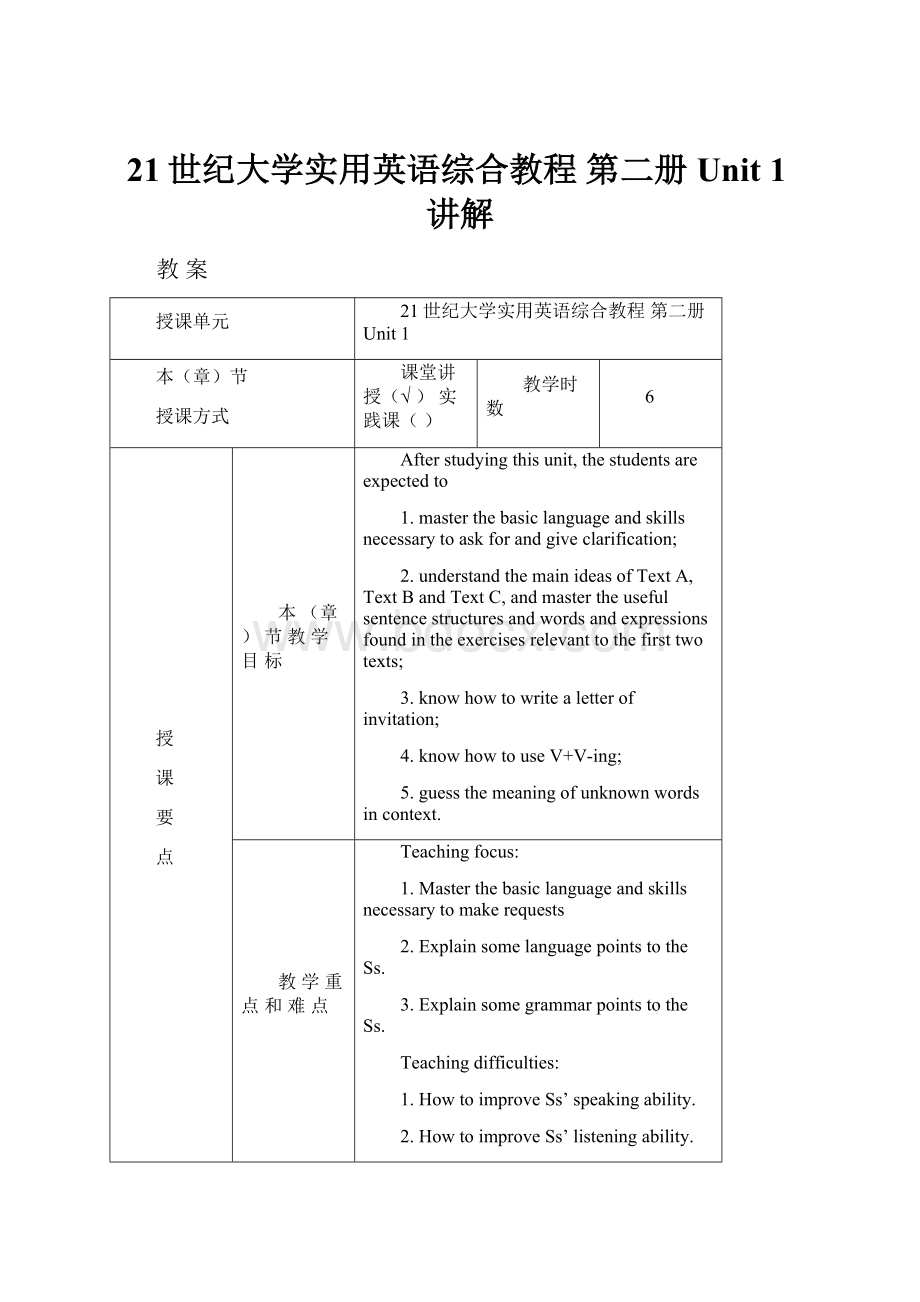21世纪大学实用英语综合教程 第二册 Unit 1讲解.docx
《21世纪大学实用英语综合教程 第二册 Unit 1讲解.docx》由会员分享,可在线阅读,更多相关《21世纪大学实用英语综合教程 第二册 Unit 1讲解.docx(19页珍藏版)》请在冰豆网上搜索。

21世纪大学实用英语综合教程第二册Unit1讲解
教案
授课单元
21世纪大学实用英语综合教程第二册Unit1
本(章)节
授课方式
课堂讲授(√)实践课()
教学时数
6
授
课
要
点
本(章)节教学目标
Afterstudyingthisunit,thestudentsareexpectedto
1.masterthebasiclanguageandskillsnecessarytoaskforandgiveclarification;
2.understandthemainideasofTextA,TextBandTextC,andmastertheusefulsentencestructuresandwordsandexpressionsfoundintheexercisesrelevanttothefirsttwotexts;
3.knowhowtowritealetterofinvitation;
4.knowhowtouseV+V-ing;
5.guessthemeaningofunknownwordsincontext.
教学重点和难点
Teachingfocus:
1.Masterthebasiclanguageandskillsnecessarytomakerequests
2.ExplainsomelanguagepointstotheSs.
3.ExplainsomegrammarpointstotheSs.
Teachingdifficulties:
1.HowtoimproveSs’speakingability.
2.HowtoimproveSs’listeningability.
思考题
或
作业
1.Reviewthekeyexpressionsfromthepreviouslesson.
2.ReadTextBofthisunit,anddeepentheunderstandingofthethemeinthisunit.Sharereflectionsonthisthemeinclass.
3.Reviewthenewwordsandphrasesofthistext.Trytousethemindailylife.
4.Finishthereadingandlisteningtasksofthisunit.
教学内容与组织安排
1stperiod
TextA(GlobalReading)
2ndperiod
TextA(DetailedReading)
3rdperiod
GrammarReview
4thperiod
PracticalWriting
5thperiod
TextB
6thperiod
ImproveYourReadingSkills
1stperiodTextA(GlobalReading)
1BackgroundInformation
EnglishLanguage
TheEnglishlanguageisthemostwidelyspokenlanguageintheworld.Itisusedaseitheraprimaryorsecondarylanguageinmanycountries.
Duringthe1500s,fewerthan2millionpeoplespokeEnglish.AllofthemlivedinwhatisnowGreatBritain.Throughthecenturies,astheresultofvarioushistoricalevents,Englishspreadthroughouttheworld.Today,about400millionpeoplespeakEnglishastheirnativelanguage.MostofthemliveinAustralia,Canada,GreatBritain,Ireland,NewZealand,SouthAfrica,andtheUnitedStates.
Another100millionpeoplelivingchieflyinBangladesh,India,Pakistan,andinmanyAfricancountriesspeakEnglishinadditiontotheirownlanguage.Anadditional200millionpeopleprobablyknowatleastsomeEnglish.(Fromthe1998WorldBookMultimediaEncyclopedia)
CharacteristicsofEnglish
Vocabulary.Englishhasalargervocabularythananyotherlanguage.Therearemorethan600,000wordsinthelargestdictionariesoftheEnglishlanguage.
SomeEnglishwordshavebeenpassedonfromgenerationtogenerationasfarbackasscholarscantrace.Thesewords,suchaswoman,man,sun,hand,love,go,andeat,expressbasicideasandfeelings.Later,manywordswereborrowedfromotherlanguages,includingArabic,French,German,Greek,Italian,Latin,Russian,andSpanish.Forexample,algebraisfromArabic,fashionfromFrench,pianofromItalian,andcanyonfromSpanish.
Anumberofwords,suchasdoghouseandsplashdown,wereformedbycombiningotherwords.Newwordswerealsocreatedbyblendingwords.Forexample,motorandhotelwereblendedintomotel.Wordscanbeshortenedtoformnewwords,aswasdonewithhistorytoformstory.Wordscalledacronymsareformedbyusingthefirstletterorlettersofseveralwords.Thewordradarisanacronymforradiodetectionandranging.
PronunciationandspellinginEnglishsometimesseemillogicalorinconsistent.Manywordsarespelledsimilarlythoughpronounceddifferently.Examplesincludecough,though,andthrough.Otherwords,suchasblue,crew,to,too,andshoe,havesimilarpronunciationsbutarespelleddifferently.ManyofthesevariationsshowchangesthatoccurredduringthedevelopmentofEnglish.Thespellingofsomewordsremainedthesamethroughthecenturies,thoughtheirpronunciationchanged.
Grammaristhesetofprinciplesusedtocreatesentences.Theseprinciplesdefinetheelementsusedtoassemblesentencesandtherelationshipsbetweentheelements.Theelementsincludepartsofspeechandinflections.
PartsofspeecharethewordcategoriesoftheEnglishlanguage.Scholarsdonotallagreeonhowtodescribethepartsofspeech.Thetraditionaldescriptionlistseightclasses:
nouns,pronouns,verbs,adjectives,adverbs,prepositions,conjunctions,andinterjections.Themostimportantrelationshipsofthepartsofspeechincludesubjectandverb,verbandpredicate,andmodifierandthewordmodified.
EnglishhasfewerinflectionsthanmostotherEuropeanlanguages.AnEnglishnounhasonlytwoinflections,thepluralandthepossessive.Inflectionsareusedtochangethetenseandnumberofaverborthecaseofapronoun.Inflectionscanchangeadjectivestothecomparativeorthesuperlative—forexample,big,bigger,biggest.
AmericanEnglish
AmericanEnglishisavarietyoftheEnglishlanguagespokenintheUnitedStates.AlthoughallAmericansdonotspeakthesameway,theirspeechhasenoughincommonthatAmericanEnglishcanberecognizedasavarietyofEnglishdistinctfromBritishEnglish,AustralianEnglish,andothernationalvarieties.AmericanEnglishhasgrownupwiththecountry.ItbegantodivergefromBritishEnglishduringitscolonialbeginningsandacquiredregionaldifferencesandethnicflavorduringthesettlementofthecontinent.
TodayitinfluencesotherlanguagesandothervarietiesofEnglishbecauseitisthemediumbywhichtheattractionsofAmericanculture—itsliterature,motionpictures,andtelevisionprograms—aretransmittedtotheworld.
CharacteristicsofAmericanEnglish
A.Pronunciation
Inbroadterms,CanadianandAmericanspeakerstendtosoundlikeoneanother.TheyalsotendtosounddifferentfromalargegroupofEnglishspeakerswhosoundmoreBritish,suchasthoseinAustralia,NewZealand,andSouthAfrica.Forexample,mostCanadiansandAmericanspronounceanrsoundafterthevowelinwordslikebarn,car,andfarther,whilespeakersfromtheBritishEnglishgroupdonot.Also,someBritishEnglishspeakersdrophsoundsatthebeginningofwords,sothatheandhisarepronouncedasiftheywerespelledeeandis.TheEnglishspokeninAustralia,NewZealand,andSouthAfricasoundsmorelikeBritishEnglishthanAmericanEnglishdoesbecausethesevarietieshavehadlesstimetodivergefromBritishEnglish.TheprocessofseparatedevelopmentbeganlaterinthesecountriesthaninNorthAmerica.
InsomecasestherearedifferencesbetweenAmericanEnglishandBritishEnglishintherhythmofwords.Britishspeakersseemtoleaveoutasyllableinwordslikesecretary,asifitwerespelledsecretry,whileAmericanskeepallthesyllables.Theoppositeistrueofotherwords,suchasspecialty,whichAmericanspronouncewiththreesyllables(spe-cial-ty)whileBritishspeakerspronounceitwithfivesyllables(spe-ci-al-i-ty).Vowelsandconsonantsmayalsohavedifferentpronunciations.BritishspeakerspronouncezebratorhymewithDebra,whileAmericanspeakersmakezebrarhymewithLibra.CanadianandBritishspeakerspronouncethewordscheduleasifitbeganwithanshsound,whileAmericanspronounceitasifitbeganwithansksound.
B.Words
ThemostfrequentlyusedwordsaresharedbyspeakersofdifferentvarietiesofEnglish.Thesewordsincludethemostcommonnouns,themostcommonverbs,andmostfunctionwords(suchaspronouns,articles,andprepositions).ThedifferentvarietiesofEnglishdo,however,usedifferentwordsformanywordsthatareslightlylesscommon—forexample,BritishcrispsforAmericanpotatochips,AustralianbillabongforAmericanpond,andCanadianchesterfieldforAmericansofa.ItisevenmorecommonforthesamewordtoexistwithdifferentmeaningsindifferentvarietiesofEnglish.CornisageneralterminBritain,forwhichAmericansusegrain,whilecorninAmericanEnglishisaspecifickindofgrain.ThewordpondinBritishEnglishusuallyreferstoanartificialbodyofwater,whereaspondsalsooccurnaturallyinNorthAmerica.BritishEnglishchemististhesameasAmericanEnglishdrugstore,andinCanadapeoplegotothedruggist.ManyofthewordsmosteasilyrecognizedasAmericaninoriginareassociatedwithaspectsofAmericanpopularculture,suchasgangsterorcowboy.
C.Spelling
AmericanEnglishspellingdiffersfromBritishEnglishspellinglargelybecauseofoneman,AmericanlexicographerNoahWebster.Inadditiontohiswell-knownAnAmericanDictionaryoftheEnglishLanguage(1828),WebsterpublishedTheAmericanSpellingBook(1783,withmanysubsequenteditions),whichbecameoneofthemostwidelyusedschoolbooksinAmericanhistory.Webster’sbookssoughttostandardizespellingintheUnitedStatesbypromotingtheuseofanAmericanlanguagethatintentionallydifferedfromBritishEnglish.ThedevelopmentofaspecificallyAmericanvarietyofEnglishmirroredthenewcountry’sseparatepoliticaldevelopment.Webster’smostsuccessfulchangeswerespellingswithorinsteadofour(honor,laborfortheBritishhonour,labour);witherinsteadofre(center,theaterfortheBritishcentre,theatre);withansinsteadofac(defense,licensefortheBritishdefence,licence);withafinalckinsteadofque(check,maskfortheBritishcheque,masque);andwithoutafinalk(traffic,public,nowalsousedinBritishEnglish,fortheoldertraffick,publick).Laterspellingreformcreatedafewotherdifferences,suchasprogramforBritishprogramme.CanadianspellingvariesbetweentheBritishandAmericanforms,moreBritishineasternCanadaandmoreAmericaninwesternCanada.
2.GroupDiscussion
Haveyoueverhadanexperienceinwhichyouaremisunderstoodorhavefailedtounderstandothers?
Misunderstandingscanresultfromthespokenformorwrittenformofthelanguagetha